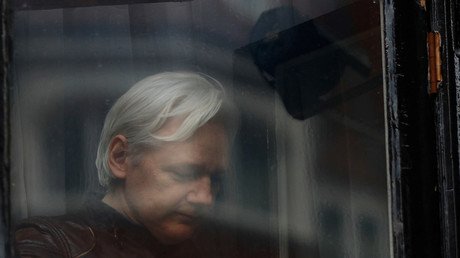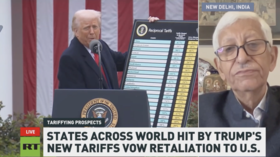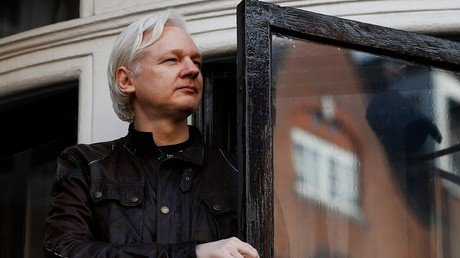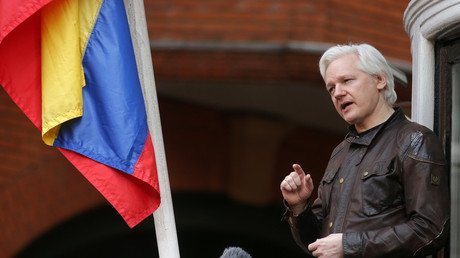‘US sees UK as obedient poodles in Assange case’
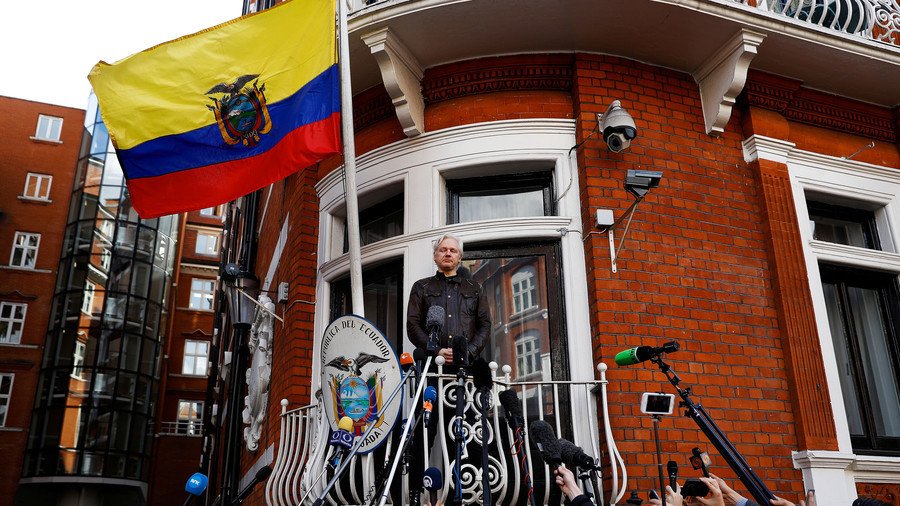
Britain’s rejection of the Ecuadorian request to grant Julian Assange diplomatic status confirms the extent to which the US is prepared to go to get their hands on him, former US diplomat Jim Jatras said.
Britain’s rejection of the Ecuadorian request to grant Julian Assange diplomatic status confirms the extent to which the US is prepared to go to get their hands on him, former US diplomat Jim Jatras said.
It emerged this week that WikiLeaks founder Assange, an Australian citizen, was granted a passport by Ecuador back in December. The Ecuadorian embassy in London has been hosting Assange since 2012, after he requested political asylum.
However, the British authorities rejected the Ecuadorian government’s request to assign diplomatic status to the WikiLeaks founder, which could allow Assange to leave the embassy without being arrested.
Ecuadorian Foreign Minister Maria Fernanda Espinosa said Thursday the country is looking for other “dignified solutions for all parties” in the dialogue with Britain.
MORE: #Assange tweeted a picture of himself dressed in national colors of Ecuador while reports circulated in the media https://t.co/jFlM4LQCMOpic.twitter.com/edpbCGjzfA
— RT (@RT_com) January 10, 2018
Meanwhile, according to the British Foreign Office, the only way to settle the issue is “for Julian Assange to leave the embassy to face justice.”
RT spoke to former US diplomat Jim Jatras about the Assange saga.
RT: Julian Assange is now a citizen of Ecuador. Will that make it any easier for him to get out of the embassy without being arrested?
Jim Jatras: Immediately it doesn’t appear so. And even Ecuador’s request to give him diplomatic status being summarily denied by the British government simply immiserates the extent to which the US authorities are determined to get their mitts on him and have this notion that “we should have worldwide jurisdiction,” and that “the British government, as our obedient poodles, will do whatever we want.”
After all, the pretext that he was going to be arrested on earlier was this phony sex charge from Sweden, which is now defunct. There is no real reason that the British could even point to now to say that they will arrest him. Nonetheless they seem to be bound and determined to do so. That is only because the Americans insist on it.
"The chance of him getting a free and fair trail in the US is minimal" says political activist George Barda as @JulianAssange remains in limbo despite being granted Ecuadorian citizenship.MORE: https://t.co/NIaFXO6ATGpic.twitter.com/PtDQlltjiV
— RT UK (@RTUKnews) January 12, 2018
RT: The police force in London have spent millions of pounds guarding the embassy round the clock for the past five years, waiting for Assange to step out. Wouldn't sending him to Ecuador be a good opportunity to get him off their hands and resolve this problem?
JJ: I suppose when you have a demand from Washington then no expense of the British taxpayers is too much to pay to make sure Uncle Sam is happy. I am sure that the British taxpayers – what they thought about was to say: “Hey, why are we spending all this money just that some other country can get their hands on this fellow?”
RT: Sweden dropped its investigation into Assange last year, and there has been no formal extradition request from the US. Why is Assange so sure that he would end up in America, if the UK police were to arrest him?
JJ: To start with, the very fact that the British have rejected out of hand Ecuador’s request to give him diplomatic status shows that the policy of the British government hasn’t changed. They made it clear he’ll be arrested. Since there is nothing else that is visible, we have to assume that there is a non-public request from the American authorities to the British – there’s sort of the five eyes, very close cooperation between the American, the British, the Australian, the New Zealand, the Canadian intelligence services. There is secret communication here. I don’t think it is secret, but everybody knows what is going on.
RT: Earlier WikiLeaks tweeted that Assange’s detention violates international law. Would you agree with that?
JJ: I don’t know what the basis is for saying so that it’s arbitrary detention. You can make an argument: “He is detaining himself in the embassy, so get won’t get arrested or extradited to the US.” You could argue that either way. The question is: Will that finding have any effect on the British or the American authorities? And I don’t think so.
RT: Now that Assange has Ecuadorian citizenship, as someone who is familiar with the diplomatic process, does this means that he is eligible for diplomatic status now from the Ecuadorian government?
JJ: Not necessarily. The way this works is that a country can name somebody on their side as having diplomatic status. But that then has to be accepted and recognized by the host country – in this case the UK. This even goes up to the ambassadorial rank. You can say you want to send somebody to another country as ambassador, but they have to accept that person. They have to accredit that diplomat to their country. So it is within the sovereign rights of the UK to say: “No, we don’t accept this diplomatic status.” But that then gets the underlying question: “Why are they doing that?”
